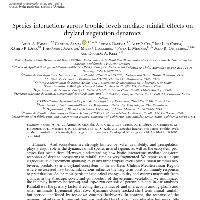Resumen
- Arid ecosystems are strongly limited by water availability, and precipitation plays a major role in the dynamics of all species in arid regions, as well as the ecosystem processes that occur there. However, understanding how biotic interactions mediate long‐term responses of dryland ecosystems to rainfall remains very fragmented. We report on a unique large‐scale field experiment spanning 25 years and three trophic levels (plants, small mammal herbivores, predators) in a dryland ecosystem in the northern Chilean Mediterranean Region where we assessed how biotic interactions influence the long‐term plant community responses to precipitation. As the most persistent ecological changes in dryland systems may result from changes in the structure, cover, and composition of the perennial vegetation, we emphasized the interplay between bottom‐up and top‐down controls of perennial plants in our analyses. Rainfall was the primary factor affecting the dynamics of, and interactions among, plants and small mammals. Ephemeral plant cover dynamics closely tracked short‐term annual rainfall, but seemed unaffected by top‐down controls (herbivory). In contrast, the response of the perennial plant cover to precipitation was mediated by: (i) a complex interplay between subtle top‐down (herbivory) controls that become more apparent in the long‐term, (ii) competition with ephemeral plants during wet years, and (iii) an indirect effect of predators on subdominant shrubs and perennial herbs. This long‐term field experiment highlights how climate‐induced responses of arid perennial vegetation are influenced by interactions across trophic levels and temporal scales. In the face of global change, understanding how multi‐trophic controls mediate dryland vegetation responses to climate is essential to properly managing the conservation of biodiversity in arid systems.
